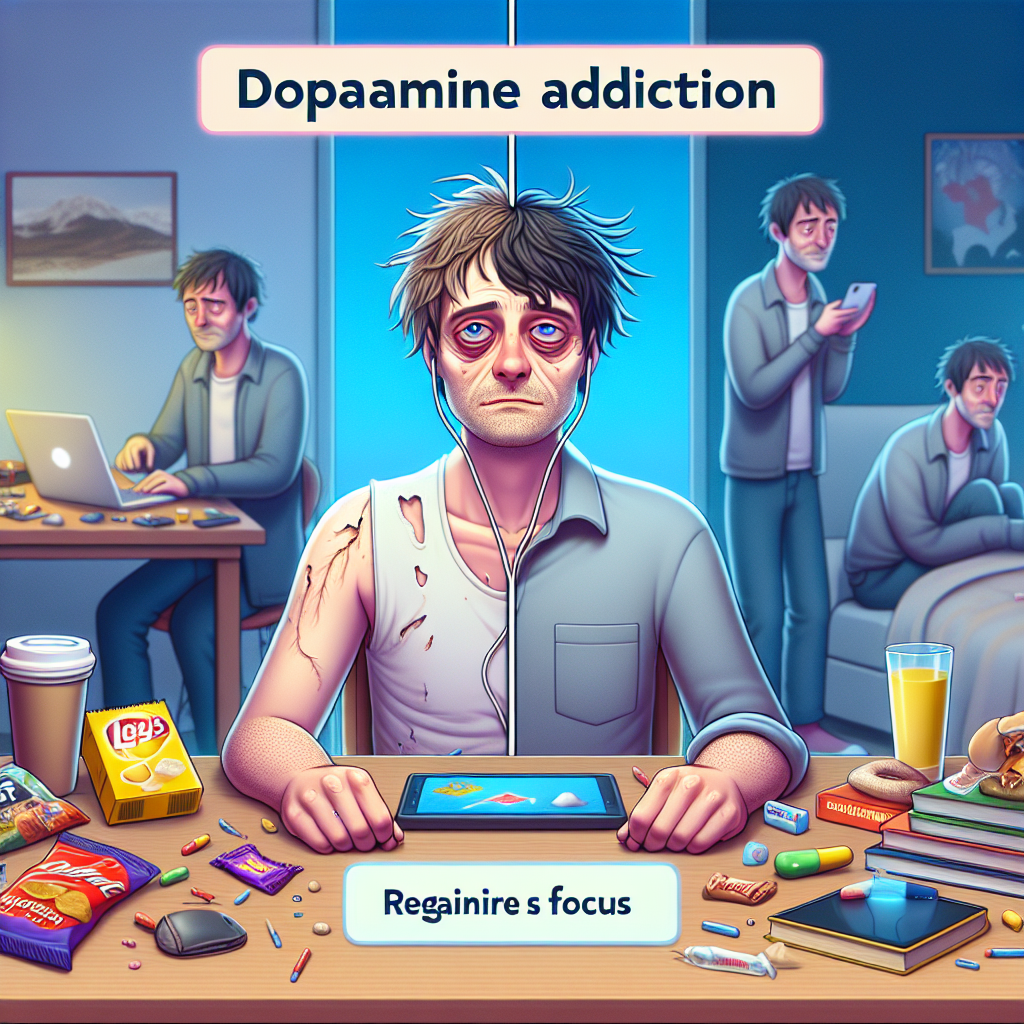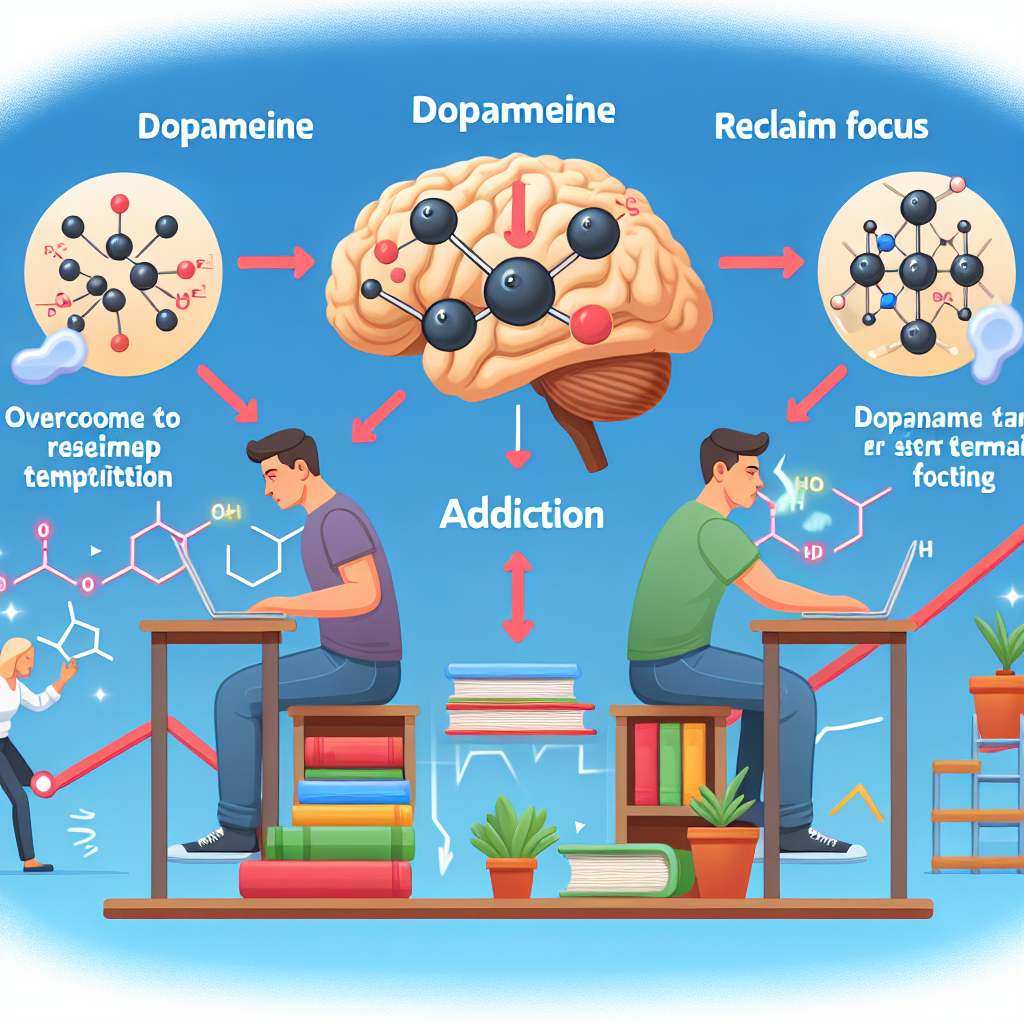How to Fix Dopamine Addiction and Reclaim Your Focus

Ready to reclaim your focus and overcome dopamine addiction? Learn effective strategies and techniques on how to fix dopamine addiction at Vibrant Vitality. Take the first step towards a healthier, more focused you today!
Overcoming Dopamine Addiction: Steps to Regain Your Focus
Dopamine addiction, a term that has gained traction in recent years, refers to the over-reliance on dopamine-releasing activities such as excessive use of social media, video games, and other digital distractions. This addiction can lead to a lack of focus, decreased productivity, and even mental health issues. However, overcoming dopamine addiction and reclaiming your focus is not an insurmountable task. With the right strategies and a commitment to change, you can regain control over your attention and productivity.
The first step in overcoming dopamine addiction is understanding its nature. Dopamine is a neurotransmitter, a chemical messenger in the brain that plays a crucial role in how we feel pleasure. It’s released when we engage in activities we enjoy, making us want to repeat them. In the digital age, our brains are constantly bombarded with stimuli that trigger dopamine release, leading to a cycle of addiction. Recognizing this pattern is the first step towards breaking free from it.
Once you’ve acknowledged the problem, the next step is to gradually reduce your exposure to dopamine-triggering activities. This doesn’t mean you have to completely eliminate all sources of pleasure from your life. Instead, aim for a balanced approach. Limit your use of digital devices, especially during work hours or when you need to focus on a task. Set specific times for leisure activities and stick to them. This way, you can still enjoy your favorite pastimes without letting them interfere with your productivity.
In addition to limiting exposure, it’s also important to replace dopamine-triggering activities with healthier alternatives. Physical exercise, for instance, not only releases dopamine but also other feel-good chemicals like endorphins and serotonin. Incorporating regular exercise into your routine can help satisfy your brain’s need for pleasure in a healthier way. Similarly, engaging in hobbies that require focus and concentration, such as reading, painting, or playing a musical instrument, can help retrain your brain to enjoy activities that don’t involve constant digital stimulation.
Another effective strategy is mindfulness meditation. By training your mind to stay in the present moment, you can reduce your reliance on external stimuli for pleasure. Mindfulness helps you become more aware of your thoughts and feelings, allowing you to recognize and resist the urge to engage in dopamine-triggering activities. Regular practice can lead to improved focus and concentration, making it easier to resist distractions.
Lastly, don’t underestimate the power of a good night’s sleep. Lack of sleep can make you more susceptible to dopamine addiction, as your brain seeks out quick sources of pleasure to compensate for the lack of rest. Prioritizing sleep can help restore your brain’s natural balance, making it easier to resist the lure of dopamine-triggering activities.
Overcoming dopamine addiction is not a quick or easy process. It requires patience, commitment, and a willingness to make significant lifestyle changes. However, the rewards are well worth the effort. By regaining control over your focus, you can improve your productivity, enhance your mental well-being, and ultimately lead a more balanced and fulfilling life. Remember, the goal is not to eliminate dopamine entirely, but to create a healthier relationship with it. With the right strategies and a positive mindset, you can break free from dopamine addiction and reclaim your focus.
Strategies to Break Free from Dopamine Addiction and Enhance Concentration

Dopamine addiction, a term that has gained traction in recent years, refers to the over-reliance on dopamine-releasing activities such as excessive use of social media, video games, and other digital distractions. This addiction can lead to a lack of focus, decreased productivity, and an overall decline in mental health. However, there are several strategies that can help individuals break free from dopamine addiction and enhance their concentration.
The first step in overcoming dopamine addiction is recognizing the problem. This involves understanding the role of dopamine in the brain. Dopamine is a neurotransmitter that plays a crucial role in how we feel pleasure. It’s released when we engage in activities that we find enjoyable, such as eating, exercising, or interacting with loved ones. However, in today’s digital age, we’re constantly bombarded with stimuli that trigger dopamine release, leading to overstimulation and, eventually, addiction.
Once the problem is recognized, the next step is to gradually reduce exposure to dopamine-triggering activities. This doesn’t mean completely eliminating these activities, but rather limiting them. For instance, if you find yourself constantly checking social media, try setting specific times during the day for this activity and stick to them. This will help your brain adjust to lower levels of dopamine and reduce the urge to constantly seek out these stimuli.
Another effective strategy is to replace dopamine-triggering activities with healthier alternatives. Engaging in physical exercise, for instance, not only releases dopamine but also other neurotransmitters like endorphins, which can help improve mood and focus. Similarly, activities like reading, painting, or playing a musical instrument can provide a sense of accomplishment and pleasure without leading to overstimulation.
Mindfulness and meditation can also play a crucial role in overcoming dopamine addiction. These practices help train the brain to focus on the present moment, reducing the need for constant stimulation. They also help in managing stress, which is often a trigger for dopamine-seeking behaviors. Regular practice of mindfulness and meditation can lead to improved concentration and a greater sense of control over one’s actions.
Lastly, maintaining a healthy diet and sleep schedule can significantly aid in breaking free from dopamine addiction. Certain foods, particularly those high in sugar and fat, can trigger dopamine release, leading to overeating and subsequent health problems. A balanced diet, rich in fruits, vegetables, lean proteins, and whole grains, can help regulate dopamine levels in the brain. Similarly, adequate sleep is essential for the brain to function optimally. Lack of sleep can lead to increased cravings for dopamine-releasing activities, making it harder to break the addiction cycle.
In conclusion, overcoming dopamine addiction requires a multifaceted approach that involves recognizing the problem, reducing exposure to dopamine-triggering activities, replacing these activities with healthier alternatives, practicing mindfulness and meditation, and maintaining a healthy diet and sleep schedule. While this process may be challenging, the benefits of improved focus, productivity, and mental health make it a worthwhile endeavor. Remember, it’s not about completely eliminating dopamine from your life, but rather about learning to manage it in a way that supports your overall well-being.
Reclaiming Your Focus: Effective Methods to Combat Dopamine Addiction
Dopamine addiction, a term that has gained traction in recent years, refers to the over-reliance on dopamine-releasing activities such as excessive use of social media, video games, and other digital distractions. This addiction can lead to a lack of focus, decreased productivity, and even mental health issues. However, it is possible to reclaim your focus and combat dopamine addiction through a variety of effective methods.
Firstly, it is crucial to understand the role of dopamine in our bodies. Dopamine is a neurotransmitter that plays a significant role in how we feel pleasure. It’s a part of our brain’s reward system, and it’s released when we do things that our brain perceives as rewarding, such as eating, exercising, and engaging in social activities. However, in today’s digital age, our brains are constantly bombarded with dopamine-releasing stimuli, leading to overstimulation and, eventually, addiction.
One of the most effective ways to combat dopamine addiction is by practicing digital detoxification. This involves setting aside specific times during the day when you disconnect from all digital devices. This break allows your brain to reset and reduces the constant influx of dopamine. It’s recommended to start with short periods of digital detox, such as an hour a day, and gradually increase the duration.
Another method is to engage in activities that release dopamine in a more controlled and sustainable manner. Physical exercise, for instance, is a healthy way to stimulate dopamine release. Not only does it improve physical health, but it also enhances mental well-being. Similarly, engaging in hobbies that require focus and creativity, such as painting or playing a musical instrument, can also help regulate dopamine levels.
Mindfulness and meditation are also powerful tools in combating dopamine addiction. These practices help you become more aware of your thoughts and actions, allowing you to recognize when you’re seeking out dopamine-releasing activities and consciously choose healthier alternatives. Regular meditation can also help reduce stress and anxiety, which are often triggers for dopamine-seeking behaviors.
Diet also plays a significant role in dopamine regulation. Consuming a balanced diet rich in fruits, vegetables, lean proteins, and whole grains can help maintain stable dopamine levels. Foods rich in tyrosine, a precursor to dopamine, such as almonds, bananas, and avocados, can also help boost dopamine production in a healthy way.
Lastly, it’s important to seek professional help if you’re struggling with dopamine addiction. Therapists and counselors trained in addiction recovery can provide valuable guidance and support. Cognitive-behavioral therapy, in particular, has been shown to be effective in treating various forms of addiction, including dopamine addiction.
In conclusion, while dopamine addiction can significantly impact focus and productivity, it’s not an insurmountable challenge. By understanding the role of dopamine in our bodies and implementing strategies such as digital detoxification, regular exercise, mindfulness, a balanced diet, and professional help, it’s possible to reclaim your focus and lead a healthier, more balanced life. Remember, the journey to recovery is a process, and it’s okay to seek help and take small steps towards your goal.